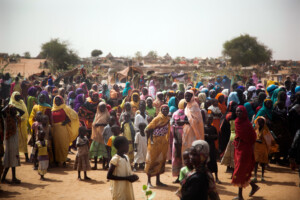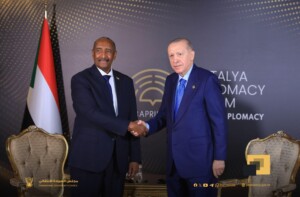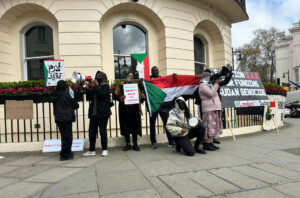Sudan’s long-awaited framework agreement signed between military and civilian bodies
More than 40 parties, movements, and professional groups signed the long-awaited political framework agreement with the military junta at the Republican Palace in Khartoum yesterday. Resistance Committees staged a protest march to condemn the agreement.
 Signing ceremony of the political framework agreement in Khartoum. Photo by Irma van Dueren, Ambassador for the Kingdom of The Netherlands to Sudan (Irma van Dueren)
Signing ceremony of the political framework agreement in Khartoum. Photo by Irma van Dueren, Ambassador for the Kingdom of The Netherlands to Sudan (Irma van Dueren)
More than 40 parties, movements, and professional groups signed the long-awaited political framework agreement with the military junta at the Republican Palace in Khartoum yesterday. Resistance Committees staged a protest march to condemn the agreement.
The framework agreement stipulates full civilian authority at all levels, and a Security and Defence Council headed by the Prime Minister.
The third of the general principles of the agreement stipulates: "Sudan is a civilian, democratic, federal, parliamentary state in which sovereignty is for the people who are the source of powers, and in which the rule of law and the peaceful transfer of power through free and fair elections and the equitable division of wealth and resources, prevail".
'Sudan is a civilian, democratic, federal, parliamentary state in which sovereignty is for the people who are the source of powers'
The agreement also puts "emphasis on one national professional army, committed to the unified military doctrine and carrying out its duties in the framework of protecting the nation’s borders and defending democratic civilian rule".
Volker Perthes, head of the UN Integrated Transition Assistance Mission in Sudan (UNITAMS), hailed the agreement as “a culmination of the sustained efforts of Sudanese stakeholders over the past year to find a solution to the political crisis and restore constitutional order, in clear line with the demands for a civilian-led transition towards elections and democracy”.
Perthes, however, also remarked "It is my hope that the principles in the document will be translated into action," asking the transitional authorities to commit.

Five important contentious issues still have to be discussed further as there are differing opinions within the coalition. The outcomes will be laid down in a ‘final agreement’ which is expected to be reached at the end of this December.
The thorny issues are concerned with justice and transitional justice, security and military reform, approaches to empowerment* removal, possible amendments to the Juba Peace Agreement, and governance issues regarding eastern Sudan.
The issue of transitional justice is also concerned with the military’s demand for impunity; which could mean immunity from prosecution for crimes committed since the 2019 coup, including the June 3 Massacre.
There has been widespread resistance within and outside of the Forces for Freedom and Change-Central Council (FFC-CC), which took a leading role in negotiations with the military, to this possibility.
At least 7,000 protesters were injured between the October 25, 2021, coup and August 2022, and the Resistance Committees of Khartoum reported that at least 120 protesters have been killed since the 2021 coup.
After the 2019 coup that took place during the revolution that toppled the Al Bashir regime, the military used extremely violent tactics to disperse a sit-in in front of the General Army Command in Khartoum in what became known as the June 3 Massacre, killing at least 186 whilst another 100 went missing and many more were injured.
Not everyone happy
Members of the resistance committees and other activists in Khartoum and Omdurman marched to the Republican Palace in the centre of Khartoum yesterday, to protest the signing of the framework agreement with the military junta.
The resistance committees have been against any form of collaboration with the military institution. Many families of martyrs, pro-democracy protesters killed by security forces also fear for an agreement that might allow the military to escape accountability.
The authorities closed the Mak Nimir Bridge between Khartoum North and Khartoum since the early morning whilst military forces were heavily deployed to block the entrance to El Gasr (Palace) Street.
The forces fired tear gas and stun grenades at the demonstrators.
* Empowerment (tamkin) is the term with which the ousted government of Omar Al Bashir supported its affiliates by granting them far-going privileges, including government functions, the setting-up of various companies, and tax exemptions. An Empowerment Removal Committee (full name Committee for Dismantling the June 30 1989 Regime, Removal of Empowerment and Corruption, and Recovering Public Funds) was established by the government of Abdallah Hamdok at the end of 2019 with the aim to purge Sudan of the remnants of the Al Bashir regime. A number of its members were detained for a number of weeks following the military coup on October 25 last year.











 and then
and then